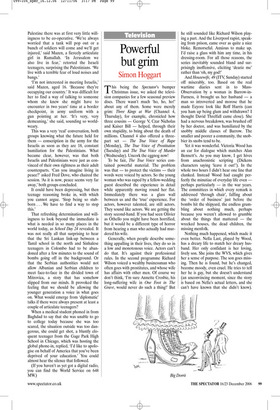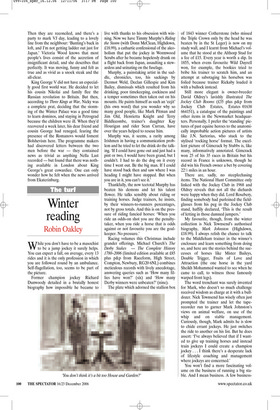Powerful but grim
Simon Hoggart
This being the Spectator’s bumper Christmas issue, we asked the television companies for a few seasonal preview discs. There wasn’t much ‘ho, ho, ho!’ about any of them. Some were merely grim: Three Kings at War (Channel 4, Thursday), for example, chronicled how three cousins — George V, Czar Nicholas and Kaiser Bill — helped, through their own stupidity, to bring about the death of millions. Channel 4 also offered a threepart set — The True Voice of Rape (Monday), The True Voice of Prostitution (Tuesday) and The True Voice of Murder (Wednesday). Uncork the eggnog now!
To be fair, The True Voice series contained powerful material. The problem was that — to protect the victims — their words were voiced by actors. So the young woman who was raped by a fellow-wedding guest described the experience in detail while apparently moving round her flat. Immediately there was a glass wall between us and the ‘true’ experience. For actors, however talented, are still actors. They sound like actors. We are getting the story second-hand. If you had seen Olivier as Othello you might have been horrified, but it would be a different type of horror from hearing a man who actually had murdered his wife.
Generally, when people describe something appalling in their lives, they do so in a low and monotonous voice. Actors can’t do that. It’s against their professional rules. In the second programme Richard Wilson voiced a wealthy businessman who often goes with prostitutes, and whose wife has affairs with other men. Of course we don’t think, ‘I’m sure Annette Crosbie, his long-suffering wife in One Foot in The Grave, would never do such a thing!’ But he still sounded like Richard Wilson playing a part. And the Liverpool rapist, speaking from prison, came over as quite a nice bloke. Remorseful. Anxious to make up. I’d raise a glass with him any time, in his dressing-room. For all those reasons, the series inevitably sounded bland and surprisingly inoffensive, eliciting ‘dearie me’ rather than ‘oh, my god!’ And Housewife, 49 (ITV, Sunday) started off miserably, too. Based on the real wartime diaries sent in to MassObservation by a woman in Barrow-inFurness, it brought us her husband — a man so introverted and morose that he made Eeyore look like Rolf Harris (can you ham up being glum and withdrawn? I thought David Threlfall came close). She had a nervous breakdown, was brushed off by her doctor, and was humiliated by the snobby middle classes of Barrow. The smaller and poorer a community, the snobbier its snobs tend to be.
Yet it was wonderful. Victoria Wood has an ear for dialogue which matches Alan Bennett’s. As you may know, I get hives from anachronistic scripting (Dickens characters saying ‘leave it out!’). In the whole two hours I didn’t hear one line that clunked. Instead Wood had caught perfectly the minutiae of everyday life even perhaps particularly — in the war years. The committees in which every remark is addressed ‘through chair’, faffing about the ‘order of business’ just before the bombs hit the shipyard, the endless grumbling about nothing much, perhaps because you weren’t allowed to grumble about the things that mattered — the wrecked houses, the dead children, the missing menfolk.
Nothing much happened, which made it even better. Nella Last, played by Wood, has a dreary life to match her dreary husband. Her only confidant is her loving, lively son. She joins the WVS, which gives her a sense of purpose. The son goes missing. Then he is found, but he’s changed, become moody, even cruel. He tries to tell her he is gay, but she doesn’t understand (an unconvincing moment, since the story is based on Nella’s actual letters, and she can’t have known that she didn’t know). Then they are reconciled, and there’s a party to mark VJ day, leading to a lovely line from the neighbour: ‘Bunting’s back in loft, and I’m not getting ladder out just for Japan.’ Victoria Wood knows that most people’s lives consist of the accretion of insignificant detail, and she describes that perfectly. It was moving, funny and felt as true and as vivid as a snoek steak and the all-clear.
King George V did not have an especially good first world war. He decided to let his cousin Nikolai and family flee the Russian revolution to Britain. But then, according to Three Kings at War, Nicky was a complete prat, deciding that the storming of the Winter Palace was a good time to learn dominos, and staying in Petrograd because the children were ill. When they’d recovered a week later, his dear friend and cousin George had reneged, fearing the presence of the Romanovs would foment Bolshevism here. The programme makers had discovered letters between the two men before the war — they contained news as trivial as anything Nella Last recorded — but found that there was nothing available in London about King George’s great cowardice. One can only wonder how he felt when the news arrived from Ekaterinburg.







































































































































 Previous page
Previous page